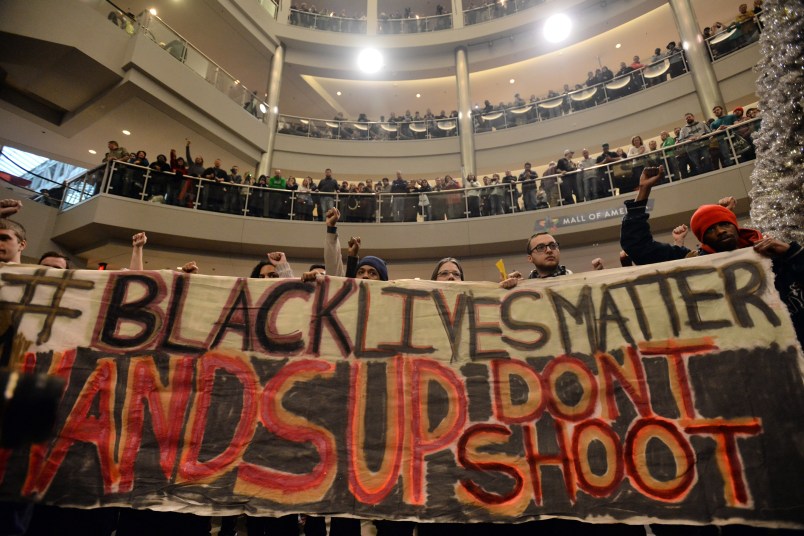Over the Christmas holiday, using #BlackLivesMatter, Iran’s Supreme Leader Ayatollah Ali Khamenei tweeted an incendiary critique of American race relations. Pointing to recent protest over police treatment of Americans of color, Khamenei compared the unrest in New York and Missouri to conflicts in the Middle East, and called on “Jesus followers” to defend the oppressed. It is doubtful that the impetus behind the Ayatollah’s tweet is a genuine concern for the lives of black Americans. His sanctimonious taunting, however, is illustrative of the powerful opening that recent events offer to America’s adversaries and detractors.
Racial discord in the United States, which most Americans view as a domestic quarrel, has been thrust into the international spotlight as a human rights crisis by America’s friends and enemies alike. Amnesty International, the global human rights organization, has weighed in with criticism of the United States’ handling of the situation in Ferguson by tweeting in August, “US can’t tell other countries to improve their records on policing and peaceful assembly if it won’t clean up its own human rights record.” China, Russia, North Korea and Egypt have covered these recent events extensively, declaring them as evidence of America’s hypocrisy.
The recent deaths of three African American males, Michael Brown, Tamir Rice, and Eric Garner, have attracted international media attention, but are only three of the hundreds of similar incidents that have occurred within the past few years. Since August, United Nations human rights experts have released several statements and official reports expressing concern that the deaths and the subsequent failure to indict the officers involved represent a bigger, systemic problem in the U.S. criminal justice system. Several UN officials have called for immediate attention to U.S. violations of international law in its “extrajudicial” killings of black Americans, in addition to its overall failure to address ongoing racial disparities.
Americans should be concerned when the nation’s principles and values are compromised. Losing credibility on domestic human rights and social justice issues is detrimental to U.S. foreign policy and national security because it weakens America’s legitimacy as a global ethical and moral leader. Recently, U.S. State Department officials calling for justice and accountability in repressive societies have been questioned and criticized over America’s treatment of black Americans. As a defender of human rights and champion of ethics-based domestic and international policies, the United States must promote a just society, supported by the rule of law, and a respect for all of its citizens with as much fervor and commitment at home as it does abroad.
The United States must take this opportunity to show the world that its democratic institutions can respond as they were designed to do by the framers of the constitution—to respect, protect, and serve the rights and freedoms of American citizens. Failure to do so diminishes the United States’ standing as a global leader on justice and human rights and feeds into the anti-American narratives spun by the Cold War anachronism Vladimir Putin, and the terrorist organization, ISIL.
To be sure, Americans are deeply indebted to law enforcement officers who take their oaths to protect and serve seriously; these men and women risk their lives every day to protect the peace in our communities. Nevertheless, there is still work to be done to ensure all Americans are accorded equal respect and protection by law enforcement and the criminal justice system. The tragic deaths of Garner, Brown, and Rice at the hands of police—coupled with negative racially-charged rhetoric from both sides—saps the United States’ moral authority abroad and undermines the American public’s confidence in its justice system.
Last month, President Obama signed an executive order creating a task force that will study policing methods around the country. It’s a start, but genuine policy changes and true structural remedies will require sustained political will and energy to address pervasive forms of discrimination in the U.S. criminal justice system. The United Nations and numerous domestic civil rights organizations such as the American Civil Liberties Union have called for specific policies that would end the use of racial profiling; reverse America’s militarized approach to policing; reduce school segregation; fix the school-to-prison pipeline; and end racial disparities in the criminal justice system at the federal, state, and local levels. What is also required is an honest acknowledgement and difficult assessment of the many underlying structural societal and economic issues that often go overlooked in public debates sparked by the loss of human life in tragic circumstances. Understanding, accountability, cooperation and patience must be the core philosophies of this effort.
The latest eruption of racial division in the United States is not just another domestic social justice crusade for Americans of color, nor is it merely another moral test for white Americans. The truth at the heart of our national disunity around race, justice, and the rule of law is a national security issue. It requires all Americans to embrace an expanded solutions paradigm that marries our collective political will to social and political action.
Dr. Rachel Gillum and Tony Johnson are Fellows with the Truman National Security Project. Gillum is a former intelligence analyst and the current Director of RiceHadleyGates LLC as well as a visiting scholar at Stanford University. Johnson is a former Department of Defense advisor, current national security researcher, and a U.S. Navy veteran. Views expressed are their own.







Essentially a restatement of the obvious. Still, there are times when it is necessary to restate the obvious regularly.
The “hands up, don’t shoot” movement is based on manufactured “facts” and not the evidence of what happened that day, thus it rings hollow.
Notwithstanding, the U.S. should stop preaching to the World, because we are not perfect, and we all know it; ergo, the criticism from perceived “enemies” falls flat.